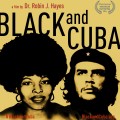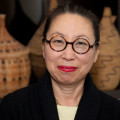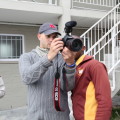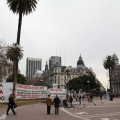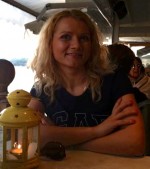 Diana Rusu is originally from the Republic of Moldova where she completed her undergraduate studies prior to coming to The New School. During summer 2013 she participated in the IFP to Turkey where she interned with the Habitat Center for Development and Governance. Here she ‘helped develop youth participation and examined the importance of female power in Turkish society.
Diana Rusu is originally from the Republic of Moldova where she completed her undergraduate studies prior to coming to The New School. During summer 2013 she participated in the IFP to Turkey where she interned with the Habitat Center for Development and Governance. Here she ‘helped develop youth participation and examined the importance of female power in Turkish society.
Want to be part of this series? Shoot us an email at [email protected].
interview conducted by Benjamin Ace
Where did you complete your undergraduate studies?
I graduated the Academy of Economic Studies from Chisinau, Moldova with a specialization in International Economic Relations. My research and final thesis analyzed the Republic of Moldova economic integration into the world economy under the framework of globalization and regionalization processes. I decided to pursue my graduate studies after five years of experience in the field of development.
What kind of development work were you doing before coming to The New School?
[I was working] as a researcher at the Institute of Economy, Finance and Statistics [where] I analyzed the development of the wine industry in the context of globalization and regional new political shifts. I presented the findings at the Scientific and Practical Conference in fall 2010 and 2011.At The Business Advisory Center, within the “New Perspectives for Youths and Women” project, I helped youth, in particular young women, in their career path. The project beneficiaries came from a poor economic background, therefore all of them got a financial scholarship during the period of the first 6 months. Our goal was to employ as many of those young people as possible. I organized trainings and professional courses, advocated for available job positions within public and private institutions, found new collaborations.
At the Moldova Governance Threshold Country Program, I developed a strong competency in working with public and private stakeholders, creating strategic collaborations, planning and implementing training events. In addition, I collected and analyzed evaluation data for the Health Component of the Program.
So, I had a little bit of professional experience back home, but I wanted to improve my knowledge further. I wanted to have a strong theoretical background in development and acquire international experience. My objective was to think beyond Eastern European realities. I wanted to know more about the developments in Africa, Latin America, and Middle East. For this reason, The New School was the best choice for me due to the International Field Program (IFP) and Practicum in International Affairs (PIA).
 Did you see benefits in doing an internship through the IFP as opposed to finding an internship independently?
Did you see benefits in doing an internship through the IFP as opposed to finding an internship independently?
I think this is a matter of preference. For me, IFP was a priority. Yes, I had a complex spring semester followed by a rigorous course of study in summer, but it was worth it! It was such a challenge and an amazing experience taking into account the summer 2013 protests in Turkey, which started on 28th of May 2013 in Istanbul (the beginning of IFP), initially to contest the urban development plan for Taksim Gezi Park. I came back from Turkey and I applied for an internship at UN Women and got a position with Knowledge Gateway for Women’s Economic Empowerment. I succeeded to do both of them J and I know most of my colleagues did the same thing.
Looking back and glancing through the IFP application process, interview, trainings, I would like to give a big credit to the IFP team and in particular to Everita Silina, IFP Turkey Coordinator. They organized everything, even the minor details. We even got the directions how to get from the Airport to Republika Academic Apartments in Ortokoy, our hope during the IFP in Istanbul. The housing was very safe and it had everything needed for study and recreation. Security was the number one priority; therefore I didn’t feel in danger, even during the strikes.
Tell me about your internship with Habitat Center for Development?
I guess I brought a fresh view, a new prospective to things. I was lucky to work in both offices (Ulus and Eminonu), in two different projects: International Youth Leadership Academy and International Entrepreneurship Initiative, therefore the assignments were different. I tried to input as much as possible. Mainly I did policy work. I developed a research approach and developed a questionnaire for entrepreneurs with innovative ideas; I wrote/put together a training curriculum for young entrepreneurs with limited or no university studies; prepared the English text for their website etc.
 Your final IFP research paper discussed the importance of female power in Turkish society. How did you come to focus on this particular issue and can you discuss some of the specific issues you explored in your paper?
Your final IFP research paper discussed the importance of female power in Turkish society. How did you come to focus on this particular issue and can you discuss some of the specific issues you explored in your paper?
The role of women in today’s Turkey is a complex and ambiguous topic of discussion. On one hand, the European Union membership candidacy forces Turkey’s government and diverse public and private actors to respect and promote women’s rights. On the other hand, there are various ongoing gender equality struggles, especially in Turkey’s rural areas. Therefore, I was interested to study and observe the importance of women in Turkey’s society, and analyze their opportunities and challenges.
I began the research with the supposition that women’s importance in social-economical life can increase, therefore they can make a difference. The purpose of my research was to identify conditions that give rise to an environment that is suitable for such a change. I argued that the best way Turkish women can change the old perception is by taking a participatory approach and becoming more active in economic, social and political life
Nowadays, women in Turkey are present in the fields where women have not traditionally been present. We can speak now about women as successful business owners, managers, chief executive officers, board members, politicians etc. They increasingly became important actors and participants in public debates in all spheres of public life. Nevertheless, women in Turkey are facing important challenges such as gender discrimination, income inequality, and prohibited access to education. Therefore it is necessary to research the role of women in today’s Turkey, and focus on the importance of female power in society.
As a result of my research and interviews I have concluded that the best way women can bring the change is by taking a more participatory approach. They should involve themselves in professional trainings, they should be educated, come with ideas and develop them (even if this means failing sometimes) [and as a result] they [will] become aware of their rights and gender equality in society. They [will] fight and speak for their liberties, they [will] become more powerful. The Gezi Protest was just a start. And as Aylin (one of my interviewees) suggested, “this was a historical moment, a process with no leader, different groups, but united. Too much good suddenly, no one could imagine. I can look to the future better now. I see now, we are not sleeping and this is very important.”[1]
What challenges did you encouter during the IFP?
I think the biggest challenge for me was my level of command of the Turkish language. I had basic communicational skills and I am glad I had a chance to improve it over summer, but I wish I could speak Turkish fluently. Not all my colleagues spoke English. Still, our interactions were interesting. In the evenings I prepared some notes on a piece of paper and on the second day I had my speech ready. I was glad I could go beyond “Good Morning. How are you?” and actually talk about the latest developments in Gezi Park.
 What was the most enlightening or surprising thing about working in Turkey?
What was the most enlightening or surprising thing about working in Turkey?
I have always wanted to visit Turkey. While in school, I was attracted by Historical Documentaries with Sultans (i.e. Osman Bey, Süleyman the Magnificent, Bayezid I) and famous Ottoman Empire battles (i.e. Vaslui, Valea Alba, Plevna). Later, during university years, I analyzed Turkey as a strategic partner and investor for Moldova, my native country. Afterwards, it was appealing to observe Turkey’s integration process into the European Union and its major changes under the influence of globalization. At the crossroads of Europe and the Middle East, today, Turkey has become an important actor in the global political, economic and cultural arena. The events in summer 2013 prove it once again.
I always was amazed by the Ottoman culture and its mix with European culture, but I didn’t expect to fall in love with it. I knew I would like Istanbul, but I never thought I would miss it.
Istanbul has always been the city of anachronisms. I was surprised, in the main square by Gezi Park one could participate and observe the protests, while in the old city hundreds of tourists enjoyed their time near the Sultanahmet Palace and the Blue Mosque. The most informative moments for me were during my interviews with women entrepreneurs/ employed women. I could understand the reforms through the eyes of ordinary people.
What would you say to students who are preparing to go on the 2014 Turkey IFP?
I am sure you made the best choice! Be active, talk with local people, participate in all possible activities, and enjoy reading by the Bosforus. Size harika bir yaz gecirmenizi diliyorum! (Have a great summer!)
[1] Aylin Jabbuolie (owner No:19 Yemek Evi, Istanbul), interview by Diana Rusu, Istanbul, July 6,2013

